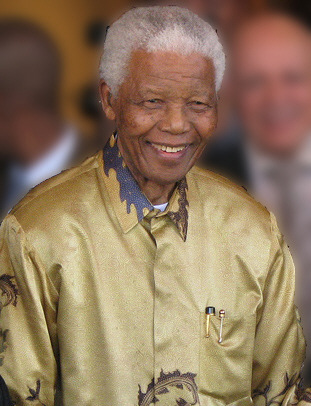From prison to presidency: Remembering Nelson Mandela

Remembering Madiba: “He belongs to the ages,” said President Obama, and many Harker students agree. Nelson Mandela, who died yesterday, spent the majority of his 95 years campaigning for racial equality in every available platform, from prison to the presidency.
Flags around the world flew at half mast after South African leader Nelson Mandela died on Thursday of health issues, surrounded by family.
Mandela played an instrumental role in ridding the country of apartheid, taking his message of equality from prison to the presidency. He was 95.
“Our nation has lost its greatest son,” said current South African president Jacob Zuma.
Before Mandela’s touch, South Africa lay divided on racial lines, with rampant cultural and legislative discrimination. Apartheid policies delegated native South Africans to less than ten percent of the nation’s land.
By the 1950s, only blacks with sufficient documentation in the form of “pass books” were allowed on white land, according to the United Nations Cyber School Bus. In 1952, with the African National Congress (ANC), a protesting young Mandela burned his pass book.
In the following years, his involvement in the ANC grew, and Mandela was sentenced to life in jail for sabotage in 1973. During his imprisonment, South Africa felt increasing international and domestic pressure to end apartheid. In 1990, after 27 years, he stepped outside, a free man.
Following his release, he became South Africa’s first black president and served from 1994 until 1999. His last public appearance was at the 2010 World Cup final.
Art teacher Jaap Bongers, who has visited Africa frequently over the past six years, sees Mandela’s impact on the region.
“He’s bigger than human over there,” he said. “He was imprisoned 27 years. If he had just retracted his remarks and his beliefs, they would have released him. But he stuck with it. To be steadfast in your convictions, that’s the important thing.”
Bongers identified the karmic nature of Mandela’s long life.
“Because he lived the way that he did, it’s almost like he got back those 27 years that he spent in prison,” he said.
“Any experience you have in South Africa and any safety you may feel while in the country was probably made possible with the help of Mandela’s efforts,” Hwang said.
For many members of the Upper School community, including aspiring disability rights activist Zina Jawadi (12), Mandela’s life contained lessons on inclusiveness, humility, and selflessness.
“Nelson Mandela serves as an excellent role model for all minorities,” she said, adding that the leader inspired her to do the same. “I wish to impact the lives of millions of people with disabilities, just like he changed the world.”
Despite all of the challenges Mandela faced in his lifetime, he maintained his beliefs and forgave those who wronged him. His message of hope is one for the ages.
“No one is born hating another person because of the color of his skin, or his background, or his religion. People must learn to hate, and if they can learn to hate, they can be taught to love, for love comes more naturally to the human heart than its opposite.” — Nelson Mandela
Read more: http://www.businessinsider.com/nelson-mandela-dead-obama-statement-2013-12#ixzz2mfqqLQ7L
Edited because previous quote were words from pop spiritual writer and guru, Marianne Williamson.

Apoorva Rangan (12) is the Editor-in-Chief of The Winged Post and a fourth-year staff member. She has previously served as the paper’s Managing Editor...

Sheridan Tobin is the co-Editor in Chief of The Winged Post. She is a senior and this is her fourth year on staff. She was the Global Editor and Opinion...


















![“[Building nerf blasters] became this outlet of creativity for me that hasn't been matched by anything else. The process [of] making a build complete to your desire is such a painstakingly difficult process, but I've had to learn from [the skills needed from] soldering to proper painting. There's so many different options for everything, if you think about it, it exists. The best part is [that] if it doesn't exist, you can build it yourself," Ishaan Parate said.](https://harkeraquila.com/wp-content/uploads/2022/08/DSC_8149-900x604.jpg)




![“When I came into high school, I was ready to be a follower. But DECA was a game changer for me. It helped me overcome my fear of public speaking, and it's played such a major role in who I've become today. To be able to successfully lead a chapter of 150 students, an officer team and be one of the upperclassmen I once really admired is something I'm [really] proud of,” Anvitha Tummala ('21) said.](https://harkeraquila.com/wp-content/uploads/2021/07/Screen-Shot-2021-07-25-at-9.50.05-AM-900x594.png)







![“I think getting up in the morning and having a sense of purpose [is exciting]. I think without a certain amount of drive, life is kind of obsolete and mundane, and I think having that every single day is what makes each day unique and kind of makes life exciting,” Neymika Jain (12) said.](https://harkeraquila.com/wp-content/uploads/2017/06/Screen-Shot-2017-06-03-at-4.54.16-PM.png)








![“My slogan is ‘slow feet, don’t eat, and I’m hungry.’ You need to run fast to get where you are–you aren't going to get those championships if you aren't fast,” Angel Cervantes (12) said. “I want to do well in school on my tests and in track and win championships for my team. I live by that, [and] I can do that anywhere: in the classroom or on the field.”](https://harkeraquila.com/wp-content/uploads/2018/06/DSC5146-900x601.jpg)
![“[Volleyball has] taught me how to fall correctly, and another thing it taught is that you don’t have to be the best at something to be good at it. If you just hit the ball in a smart way, then it still scores points and you’re good at it. You could be a background player and still make a much bigger impact on the team than you would think,” Anya Gert (’20) said.](https://harkeraquila.com/wp-content/uploads/2020/06/AnnaGert_JinTuan_HoHPhotoEdited-600x900.jpeg)

![“I'm not nearly there yet, but [my confidence has] definitely been getting better since I was pretty shy and timid coming into Harker my freshman year. I know that there's a lot of people that are really confident in what they do, and I really admire them. Everyone's so driven and that has really pushed me to kind of try to find my own place in high school and be more confident,” Alyssa Huang (’20) said.](https://harkeraquila.com/wp-content/uploads/2020/06/AlyssaHuang_EmilyChen_HoHPhoto-900x749.jpeg)


